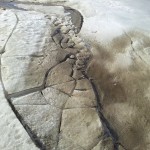Originally published as a column on NewsKamloops on Friday, September 25 2015.
The recent the Volkswagen scandal is, at best, the story of a company that got caught red-handed. Perhaps it will also open the road towards looking more into companies that use proprietary software the unlawful way.
Proprietary software is no ‘one ring to rule them all’ but it sure comes close to it. Volkswagen AG showed that temptation is real, applicable, and, if you do it right enough no one is smarter, at least for a few years anyway.
The problem is, once people discover the trickery, the proverbial fan will spread the bad matter everywhere, from deceived customers, to angry environmental protection agencies, to governments who are pressed to look after our clean air needs, it will stink. As it does at the moment.
Volkswagen’s tomfoolery costs us all, whether we bought the objects of contention or not. With almost half the cars in Europe being powered by diesel, pollution takes an even uglier turn than we expected. The rigged cars add approximately 1 million tonnes of pollutants into the atmosphere and no amount of mea culpa, in German accent or not, can undo the damage that’s been done or stop the said cars from polluting further until the company fixes the problem.
That Volkswagen AG has been cited as one of the most sustainable large companies over the years makes it a sad compounded tale. A company of that scale is more than an individual suddenly stricken by evil intentions. If you as much as imagine meeting rooms full of people who could give their thumb-ups to such decisions or veto it, it makes little sense, if any, that a collective of people acted like one mind whose goal was to make money on false claims.
Public deceit is ugly in general. Public deceit that causes harm globally and increases the risk of death for us all. Just two years ago the World Health Organization declared air pollution a carcinogen and attributed up to 7 million premature deaths to it.
If we look back into the recent stories of deception that costs many people their lives (think smoking and cancer for example) we can allow ourselves to believe that some policy makers did not know any better, or that those who did and chose to mislead the public anyway because they were shareholders themselves or had ties with the industry made us all realize that the price of lying is a high one, almost always paid in human lives.
In a time when pollution and climate change are becoming too evident to ignore and the global community has to come up with laws that will stall the crash course, it is downright criminal to add the burden on the environment knowing that you do.
The case of the peanut company president that was sentenced to 28 years in prison for fraud that caused at least 9 people to die and sickened hundreds should have been a cautionary tale for all companies that dabble with deceit of any kind. Too late for Volkswagen AG to come clean but what about all the other companies that lie, hide it well and hope they’ll never get caught? How about us customers buying their products?
The question remains: why would anyone engage in lying and deceiving knowing that someone, somewhere, might just discover the trick? According to what we know of the human mind, the perceived benefits of what is to be gained often eclipse the risks of being discovered. It may be hard if not impossible to understand for those of us who want to go to bed knowing their conscience is clear (there is no better, softer pillow indeed) but it sure paints an accurate picture of human behaviour in general. History and literature abound with examples.
No subscriber to the infamous Ashley Madison affair-encouraging website thought ‘what if I get discovered?’ or they did not think it deeply enough to keep away. Lies are like defective vehicles, they really cannot take you far. Truth is solid ground, lies are not. The price of being caught is always higher than the price of saying no to lying, no matter how tempting the promise.
Deception hurts, at every level. In case of companies or governments, even more so because it makes us feel like we did not pay enough attention, or we were not diligent enough to know better and somehow prevent it. Having our trust betrayed is always a hard blow.
The only tool that can ensure our protection, at least to a certain extent, is transparency. The more we know of corporate affairs and of our own government’s actions, the more we realize that transparency is often not at the forefront of their actions.
Which is what gives election time such monumental importance. It’s a chance to look closely at what we want, reappraise our own values as individuals and communities too, apply the required scrutiny to candidates and their parties and choose wisely. As if our lives depend on it, because they do. Our children’s too.











